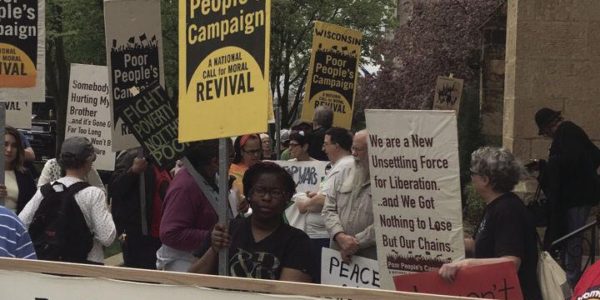Protesters launched a six-week season of nonviolent, direct action May 14, marching in Madison and rallying at the state Capitol.
They will return, on Mondays, as part of the Poor People’s Campaign: A National Call for Moral Revival. It’s an effort in at least 35 states inspired by the civil rights movement of the 1960s but rooted in the politics of today.
The protests in May focused on the connection between systemic racism, poverty and suppression.
Demonstrators called for an end to gerrymandering, reversal of state law barring municipalities from raising wages, immigration reform that protects immigrants and strengthens democracy and full restoration of the Voting Rights Act.
Some demonstrators carried signs that read, “Voter Suppression = The True Hacking of our Democracy” and “Systemic Racism is Violence.”
Similar demonstrations took place in other capitals May 14, including Washington, D.C., resulting in hundreds of arrests in the most expansive wave of nonviolent civil disobedience in U.S. history, according to organizers.
The co-chairs of the campaign, the Revs. William J. Barber of North Carolina and Liz Theoharis of New York, were among those arrested.
For two years, the leaders of the campaign carried out a listening tour across the country, meeting with tens of thousands of people, gathering testimonies and building a “Moral Agenda.”
They announced the agenda in April and released details of an “audit of America,” which shows that Americans are in many ways worse off than they were in 1968, when the Rev. Dr. Martin Luther King Jr. and other civil rights leaders launched the Poor People’s Campaign.
As the campaign continues through the summer with teach-ins, marches, voter registration drives and more, activists will call for change to address racism, ecological devastation, the war economy and, according to a news release, “our distorted moral economy.”
They will demand repeal of the 2017 federal tax law and push for universal, single-payer health care, clean water for all and better wages.
For more information about the campaign and to read the “Moral Agenda,” visit www.poorpeoplescampaign.org.
Note: This story originally published in the Wisconsin Gazette.
